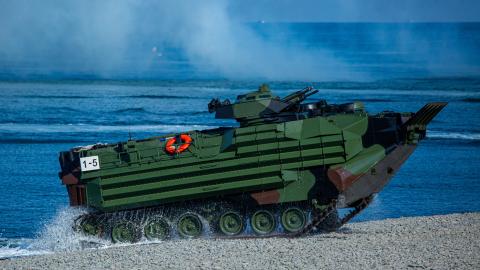NEW DELHI: Dr Miles Yu, who is the director of the China Center at Hudson Institute, spoke to The Sunday Guardian on what is being described as an “imminent” Chinese attack on Taiwan and how India needs to respond to this. Dr Yu was a critical part of the Donald Trump administration and served as the China policy adviser to Secretary of State Mike Pompeo. In that capacity, he advised the secretary on all China-related issues, helped overhaul US policy towards China, and participated in key US government interagency deliberations on major policy and government actions with regard to China and other East Asian countries, including Japan, South Korea and Taiwan.
Apart from a visiting fellow at the Hoover Institution, he is also a professor of East Asia and military and naval history at the United States Naval Academy in Annapolis, Maryland. Dr Yu specialises in Chinese military and strategic culture, US and Chinese military and diplomatic history, and US policy toward China.
Excerpts:
Q: You recently used the word “obsessed” in one of your articles while describing China’s approach to Taiwan and gave four reasons for this “obsession”. What is the cure to this?
A: The cure lies in ridding China of the CCP’s “liberation ideology,” and re-establishing a normal set of rules for engaging with the international community on the basis of mutual respect and civility.
Q: You have worked closely in the administration on the measures that the US can employ to tackle China. The United States is already tied with the events taking place in Ukraine. Will the US risk intervening militarily in Taiwan and does it have the wherewithal to operate on two fronts, against two major adversaries?
A: Yes. Ukraine is not the US’ problem alone, the same is with Taiwan. Joining hands with America’s global allies and partners, matching different capabilities with different battlefield requirements in Ukraine and Taiwan, the US and its allies will be able to prevail, should there be a military invasion of Taiwan by the CCP.
Q: In December last year, you were sanctioned by the Chinese government. How has this impacted you?
A: It impacted me in only one way: I wear the sanctions as a badge of honour.
Q: How imminent is a Chinese attack on Taiwan in your view and what is the likely end result to this action, for both China and Taiwan?
A: The risk of war on Taiwan has increased, and so have the chances of the CCP losing the war on Taiwan—that’s because the costs of a military action on Taiwan will be prohibitive and the collective will to resist China has dramatically increased.
Q: As you are aware, India is in the midst of a three-year-long border confrontation with China. As someone who has been watching this whole development from Washington, what role will India be expected to play in case of a China-Taiwan military confrontation?
A: An attack on Taiwan will be just the beginning of a chain of aggression by the CCP which has multiple territorial disputes with multiple neighbours, especially India. India must do its utmost to stop the aggression at the outset for the next target of the revanchist regime in Beijing might well be India itself. A major role India could play, and should play, is to form a regional response coalition with countries that share the CCP threat, such as Japan and Vietnam, to prepare for a Taiwan invasion scenario.
Q: Do you believe that India, which has traditionally been a believer of “non-alignment” will side with the anti-China forces and coalitions that are likely to cobble up to intervene in support of Taiwan?
A: Yes, because once India’s own national sovereignty is similarly threatened by a common adversary, Taiwan and India are in the same boat.
Q: Is there any other way to resolve the China-Taiwan issue apart from a military confrontation? Or have we crossed that line?
A: Yes, steadfastly preserving the status quo with deterrence and strategic clarity to defend Taiwan.

















